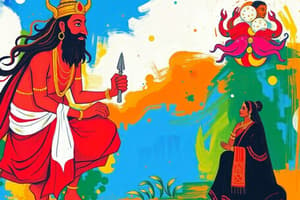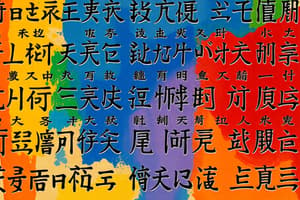Podcast
Questions and Answers
What was the primary purpose of the earliest forms of writing?
What was the primary purpose of the earliest forms of writing?
- To document commercial, administrative, and legal information (correct)
- To express artistic and poetic thoughts
- To preserve religious texts for future generations
- To record literary narratives and stories
Which two ancient civilizations contributed to the development of the alphabet?
Which two ancient civilizations contributed to the development of the alphabet?
- Romans and Persians
- Greeks and Phoenicians (correct)
- Chinese and Indians
- Egyptians and Babylonians
Which ancient writing form involved wedge-shaped characters?
Which ancient writing form involved wedge-shaped characters?
- Pictographs
- Runes
- Cuneiform (correct)
- Hieroglyphics
What is the title of the first great heroic narrative of world literature?
What is the title of the first great heroic narrative of world literature?
What time period does the Ancient Period of literature refer to?
What time period does the Ancient Period of literature refer to?
How was the story of Utnapishtim's flood significant in relation to Gilgamesh?
How was the story of Utnapishtim's flood significant in relation to Gilgamesh?
Which writing system was primarily associated with picture writing found in ancient Egypt?
Which writing system was primarily associated with picture writing found in ancient Egypt?
What significant cultural influences did literature share during the early periods?
What significant cultural influences did literature share during the early periods?
Which period is characterized by the transition from the Roman Republic to totalitarian rule under Julius Caesar?
Which period is characterized by the transition from the Roman Republic to totalitarian rule under Julius Caesar?
What is the significance of the development of Sanskrit during the Gupta period?
What is the significance of the development of Sanskrit during the Gupta period?
Who were prominent playwrights during the Classical Roman Period?
Who were prominent playwrights during the Classical Roman Period?
The works of which philosophical writers are associated with the Roman Empire?
The works of which philosophical writers are associated with the Roman Empire?
What literary genre is NOT part of the four main types in kavya literature?
What literary genre is NOT part of the four main types in kavya literature?
What work is NOT attributed to the cultural achievements during the Gupta period?
What work is NOT attributed to the cultural achievements during the Gupta period?
Which of the following does NOT belong to the early Christian writings of the Patristic Period?
Which of the following does NOT belong to the early Christian writings of the Patristic Period?
During what time frame did the Classical Roman Period occur?
During what time frame did the Classical Roman Period occur?
Which of the following is true about The Classic of Poetry?
Which of the following is true about The Classic of Poetry?
Who is credited with the production of the Historical Records during the Warring States period?
Who is credited with the production of the Historical Records during the Warring States period?
What are the Vedas considered in the context of Indian literature?
What are the Vedas considered in the context of Indian literature?
Which of the following concepts is NOT related to Hindu thought?
Which of the following concepts is NOT related to Hindu thought?
What are the main roles of the triad of gods in Hinduism?
What are the main roles of the triad of gods in Hinduism?
Which caste is primarily responsible for seeking moksha in Hindu society?
Which caste is primarily responsible for seeking moksha in Hindu society?
What is the primary purpose of dharma in Hindu thought?
What is the primary purpose of dharma in Hindu thought?
Which epic narratives are considered to embody core Hindu values?
Which epic narratives are considered to embody core Hindu values?
Which writer is known as a founder of new, popular 'realistic' literature in pre-modern Japan?
Which writer is known as a founder of new, popular 'realistic' literature in pre-modern Japan?
Which of the following writers is associated with the Romantic Period?
Which of the following writers is associated with the Romantic Period?
What thematic element is common to the Gothic writings of the late 18th and 19th centuries?
What thematic element is common to the Gothic writings of the late 18th and 19th centuries?
Which American writers are noted for their Transcendentalist beliefs?
Which American writers are noted for their Transcendentalist beliefs?
Which movement is characterized by idealizing the morality of the medieval world?
Which movement is characterized by idealizing the morality of the medieval world?
During which period did Jane Austen write, even though she is not typically categorized with the male Romantic poets?
During which period did Jane Austen write, even though she is not typically categorized with the male Romantic poets?
Which writer is associated with the Gothic genre in America?
Which writer is associated with the Gothic genre in America?
What characterized the writing of the Victorian Period?
What characterized the writing of the Victorian Period?
Which of the following writers is associated with the Modern Period in America?
Which of the following writers is associated with the Modern Period in America?
What literary movement is characterized by the rise of black writers in America?
What literary movement is characterized by the rise of black writers in America?
Which writer is NOT typically associated with the Modern Period in Britain?
Which writer is NOT typically associated with the Modern Period in Britain?
What defines the literary style of Magic Realism?
What defines the literary style of Magic Realism?
Which of the following is a characteristic of Postmodern literature?
Which of the following is a characteristic of Postmodern literature?
Which of the following writers is associated with the Lost Generation?
Which of the following writers is associated with the Lost Generation?
What critical approach suggests that language is not a stable entity?
What critical approach suggests that language is not a stable entity?
What literary period follows the Modern Period?
What literary period follows the Modern Period?
Flashcards are hidden until you start studying
Study Notes
Origins of Literature
- Literature emerged with the invention of writing, with early societies documenting observations of their environments.
- Cuneiform: Early writing system with wedge-shaped characters.
- Hieroglyphics: Picture writing prevalent in ancient Egypt, illustrating significant events with divine and religious significance.
- Development of the alphabet: Phoenicians created consonant scripts, which later incorporated Greek vowels to form the real alphabet.
Timeline of Literature
- Ancient Period (Beginnings to 100 A.D.): Involved the transition from commercial and administrative writing to literary texts.
- Gilgamesh: The first great heroic narrative nearly forgotten until rediscovered in 1872, resembling the biblical flood story.
- China: Early poetry includes "The Classic of Poetry," and ethical philosophies were recorded in Confucius’ Analects.
- Historical Records by Ssu-ma Ch'ien documented China's ruling families.
- India: The Vedas from the Aryans are sacred scriptures, leading to epics "Ramayana" and "Mahabharata," reflecting Hindu values.
- Key concepts: Dharma (moral conduct), Artha (wealth), Kama (sensuality), Moksha (liberation).
- Hindu tradition includes a triad of gods: Brahma (creator), Vishnu (preserver), Shiva (destroyer).
Literary Developments by Region
- Classical Roman Period (200 BCE-455 CE): Rome's conquest of Greece shifted cultural dominance.
- Important playwrights: Plautus, Terence.
- Significant writers: Ovid, Horace, and Virgil, with philosophers like Marcus Aurelius contributing to literature.
- India’s Classical Age: Under Gupta rule, advances in various fields including literature.
- Sanskrit developed as a refined literary language with genres such as court epic, lyric, narrative, and drama.
- Influential stories: Pañcatantra and Kathasaritsagara.
Literary Movements and Periods
- Patristic Period (c. 70 CE-455 CE): Early Christian writings emerged from key figures like St. Augustine and Tertullian.
- Pre-modern Japan: Ihara Saikaku introduced realism, focusing on merchant life, while Matsuo Basho embedded haiku into prose narratives.
- Romantic Period (c. 1790-1830): Emphasis on nature and individuality, with key figures including Coleridge, Blake, and Goethe.
- Gothic literature emerged, influencing the horror genre, with writers such as Poe in America.
- Victorian Period (c. 1832-1901): Characterized by sentimental novels; notable authors include Charles Dickens and the Brontë sisters.
- Rise of Aestheticism and Decadence movements later in the period.
Modern and Postmodern Literature
- Modern Period (c. 1914-1945): British writers like W.B. Yeats faced disillusionment, while America saw the emergence of The Lost Generation, including Hemingway and Fitzgerald.
- The Harlem Renaissance highlighted the contributions of Black writers.
- Postmodern Period (c. 1945 Onward): T.S. Eliot and others experimented with metafiction and fragmented poetry.
- Increasing representation of non-Caucasian writers and the rise of magic realism led by figures like Gabriel García Márquez.
Critical Approaches to Literature
- Critical approaches facilitate understanding literature and its interpretations.
- Central questions include: What do we read? Why do we read? How do we read?
- Deconstruction posits that language lacks stability, suggesting meaning is ever-changing and elusive.
Studying That Suits You
Use AI to generate personalized quizzes and flashcards to suit your learning preferences.




